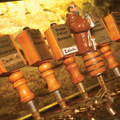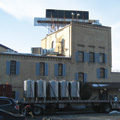Sustainable initiatives benefit Wisconsin brewpub.

In days gone by, Appleton, Wis.-based Stone Arch Brew House would watch a lot of water go down the drain when it brewed beer.
“Between transferring and cooling the beer, it was at least 300 gallons on days we brewed,” Stone Arch President and Brewmaster Steve Lonsway says. “That’s a lot of wasted water.”
That water is now being put to good use. As part of the restaurant-brewery’s extensive expansion, Lonsway installed a water reuse system - one of a number of sustainable additions that has generated savings and greater efficiencies for the state’s oldest brewpub.
Lonsway explains when the brewery transfers its beer out of the brewing tank the temperature is typically around 210° F. That water needs to be reduced to a pitching temperature of 65°. Enter the formerly wasted water.
“We run the beer through a heat exchanger (AGC ProFlow series) and a series of steel plates,” Lonsway says. “The hot beer goes through every other channel and the cold water goes through the opposite channel and they reverse the temperature. We then gather that water into the same tank and use it to rinse and clean our system. We’re recapturing water that otherwise would have been wasted.”
The benefits of the water reuse system are significant. Lonsway estimates the brewery recaptures 15 barrels of water per brewing session in the summer and nine barrels during the winter months.
“It’s been a huge difference for us,” he says. “Our water bills have gone down even though our production of beer has gone up pretty significantly. Between the labor, energy and water-cost savings, it’s been amazing. We’ve gone up from 1,200 barrels produced to 2,400 barrels produced (yearly) and our water bill went down maybe 5%. With the double in production, that’s monstrous.”
Lonsway notes prior to the implementation of the water reuse system, the brewery was being charged for water based on its sewer use.
“We convinced the water utility that we’re making beer with that water and we’re disposing of a lesser rate of water,” he says. “Now we have a lesser water and sewer rate.”

Expanding horizons
Lonsway and his father, Tom, took over the restaurant-brewery eight years ago. The restaurant serves the usual pub fare of steaks and salads and features local favorites such as elk and bison burgers. Stone Arch uses a variety of organic materials derived from local sourcing and recycling is commonplace. Lonsway closely works with a community garden located across the street where Stone Arch’s scraps are used for compost. The brewery’s spent barley is collected and given to local farmers to feed cattle. Lonsway is looking for a way to recycle the brewery’s hops and filter pads.
On the brewery side, Stone Arch produces its own Stone Arch Brew House beer. The label currently has seven full-time beers and several seasonal specialty versions. It also features a number of guest taps. In early December, Sierra Nevada’s Torpedo was featured on tap.
At the beginning of 2012, father and son embarked on an expansion project for the 9,800-sq.-ft. facility housed in an old-style mall building. The expansion included the addition of more brewing tanks to increase production capacity, while numerous other green plumbing upgrades were made to both the restaurant and the brewery. The brewery has five new tanks from Diversified Metal Engineering and two Century Manufacturing tanks recycled from a suburban Chicago brewpub once owned by late Chicago Bears great Walter Payton.
“Any plumbing having to do with the beer system, we redid it. Anything that teed off to the brewery, was redone,” explains Lonsway, a diehard Chicago Bears fan and season-ticket holder despite living in close proximity to Green Bay, Wis., home of that city’s beloved Packers. “We have new stainless-steel transfer lines, a new heat exchanger and we reconfigured the tanks so we would be more efficient.”

All about the temperature
The thermometer is everything in the beer brewing business.
“Temperature is very important when it comes to beer,” Lonsway says. “You have a 20° window when you are mixing grains with water. You need to hit certain temperatures to get certain flavor profiles. Before, we would take the hot water in the kettle and preheat it and then cool it off with incoming cold water that wasn’t treated to the Ph. With the control we now have, we can send treated water through at the exact temperature we need.”
An additional benefit for Stone Arch has been the installation of three Eternal hybrid water heaters. Prior to the expansion, the restaurant and brewery shared three tank water heaters, which presented logistical troubles.
“Before it was fine, but once the beer volume started to pick up the brewery and the kitchen would fight over the water heaters,” Lonsway says. “To combat that, the brewery staff would come in earlier and the kitchen staff would be there later for the dinner hour. That’s how they shared the heaters.”
Stone Arch also deals with the drastic weather shifts in northern Wisconsin and the effects it has on the temperature of the water coming into the building.
“Our water comes in here pretty cold in the winter,” Lonsway says. “We used to set a timer for the tank water heaters to start 3 1/2 hours before we would come in so we could start right away when we got here. Now, we can walk right in and start the heaters up. We’ve saved the kettle burner from having to run 3 1/2 hours before anybody gets in here and the brewery is now self-sufficient. We don’t fight with the kitchen anymore.”
Lonsway says water typically enters the building in the winter around 42° F and can get as cold as 39°. It can spike up to as warm as 60° in the summer. “It posed a huge problem for us back in the day,” Lonsway says.
Lonsway notes with the water coming in so cold at times, the brewery will now pre-fill what it calls a hot liquor tank (serving tank) and let the water naturally rise. That water is then run through the hybrid heaters.
“It gets heated to right where we want it,” he says. “We’re getting so much more consistency in our product and that’s extremely important. We had to get that under control. There is usually a 5° swing per batch. So we’ll program the temperature we want on the hybrid heaters and account for the 5°. If we want to hit 165°, we’ll go to 170° without any problems.”
Just like with the water reuse system, the hybrid water heaters have generated savings even though beer production has dramatically increased.
“The gas bill is pretty much the same, but the production has doubled,” Lonsway says. “I haven’t crunched all the numbers, but between the product increase and the labor hours I’m saving, to me that’s a 50% savings right there.”
Other green upgrades include the installation of 10 Mansfield low-flow toilets in the restaurant restrooms. “We had some older models in there that were using up a lot of water,” says Lonsway, who plans on converting kitchen sinks and bathroom lavs to low-flow fixtures in the near future.
Up next for Stone Arch is an even bigger step - the retail beer market.
“Up until the beginning of 2012 we self-distributed and had about 160 accounts, mainly restaurants and bars in the area,” Lonsway explains. “When our new bottler comes in we’ll switch to paper labels and we’ll be able to make six packs. Our plan is to target local grocery stores and liquor stores. Our goal is to establish ourselves as the local beer.”
And in doing so, Lonsway continues to search for even more sustainable practices.
“We’re always looking for ways to save energy, water and money,” he says.

